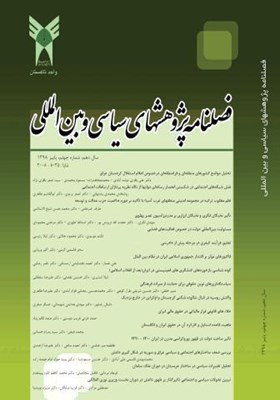بررسی ضعف ساختارهای اجتماعی و سیاسی عراق و سوریه در شکل گیری داعش
محورهای موضوعی : مجله پژوهش های سیاسی و بین المللی
کلید واژه: بحران هویت, سوریه, عراق, ساختارهای اجتماعی, بنیادگرایی تکفیری داعش,
چکیده مقاله :
محمدمهدی قاسمی علی آبادی[1]- حسین مسعودنیا[2]- سید جواد امام جمعه زاده [3] تاریخ دریافت:1/7/1397- تاریخ پذیرش:28/5/1398 چکیده: تحولات اخیر خاورمیانه و تبدیل این تحولات به بحرانی غیر قابل حل دارای زمینه ها و علل مختلفی است یکی از مهمترین علل بروز بحران هویت و بحران در فرایند دولت ملت سازی می باشد. در این چند دهه رابطه میان "هویت" و سیاست مورد بحث نظریه پردازان در رشته های سیاسی و روابط بین الملل قرار گرفته است. گروه های قومی هویتی به عنوان یکی از بازیگران، اهمیت فزاینده ای در سیاست های داخلی و بین المللی یافته اند. این گونه گروه ها می توانند مشروعیت دول را زیر سوال ببرند، به کارهایی در فراسوی مرزهای رسمی دست یازند و با برخورداری از حمایت های بین المللی، توجه نیروهای خارجی را جلب کنند. چنین کارهایی هرچند شاید مایه سرنگونی دولت ها نشود، ولی می توانند دگرگونی های چشمگیر در سیاست های داخلی پدید آورد و اسلوب روابط بین المللی را نیز دگرگون کند. در واقع می توان گفت که تنش های هویتی- قومی در بیشتر موارد برآیند تعامل های پیچیده عوامل اقتصادی، اجتماعی و سیاسی است. محدوده این پژوهش از نظر موقعیت مکانی مربوط به تحولات سیاسی و اجتماعی عراق و سوریه و فرایند شکل گیری گروه ها و جریان های افراطی و بنیادگرا می باشد. محدوده زمانی تحقیق مربوط به پس از اشغال عراق توسط ایالات متحده آمریکا در سال 2003 تا به حال و تحولات سیاسی و اجتماعی که در سوریه پس از مرگ حافظ اسد در سال 2000 و روی کار آمدن بشار اسد در نظر گرفته شده است. [1]- دانشجوی دکتری، روابط بین الملل، دانشگاه آزاد اسلامی واحد اصفهان( خوراسگان)، اصفهان، ایران mohammadmehdighasemi@hotmail.com [2]- دانشیار و عضو هیئت علمی، گروه علوم سیاسی، دانشگاه اصفهان، اصفهان، ایران: نویسنده مسئول masoudnia@ase.ui.ac.ir [3] - دانشیار و عضو هیئت علمی، گروه علوم سیاسی، دانشگاه اصفهان، اصفهان، ایران javademam@yahoo.com
Mohammadmehdi Ghasemi aliabadi[1] Dr.Hossein masoudnia[2] Dr.Seyed Javad Emam Jome Zade[3] Abstract The recent development in the Middle East and the transformation of the development into an insolvent crisis with different backgrounds and causes is one of the main causes of the identity crisis and the crisis in the nation-state process. In these decades, the relationship between "identity" and politics has been discussed by the theorists in political and international affairs. Identity ethnic groups, as one of the actors, have become increasingly important in domestic and international policies. Such groups can question the legitimacy of states, work beyond formal boundaries, and attract international attention with international support. Such actions may not be the cause of the overthrow of governments, but they can bring about dramatic changes in domestic policies and change the way international relations are developed. In fact, it can be said that ethnic tensions in most cases result from complex interactions of economic, social and political factors. The scope of this research is from the point of view of the location of the political and social developments in Iraq and Syria and the process of forming groups and extremist and fundamentalist movements. The range of research followed after the occupation of Iraq by the United States in 2003, and the political and social developments that took place in Syria following the death of Hafez Assad in 2000 and the coming of Bashar al-Assad to power. [1]. PhD student of International Relations, Islamic Azad University of Isfahan (Khorasgan), Isfahan, Iran. [2]. Associate Professor, Department of Political Science, University of Isfahan, Isfahan, Iran: Corresponding Author [3]. Associate Professor, Department of Political Science, University of Isfahan, Isfahan, Iran.
_||_

